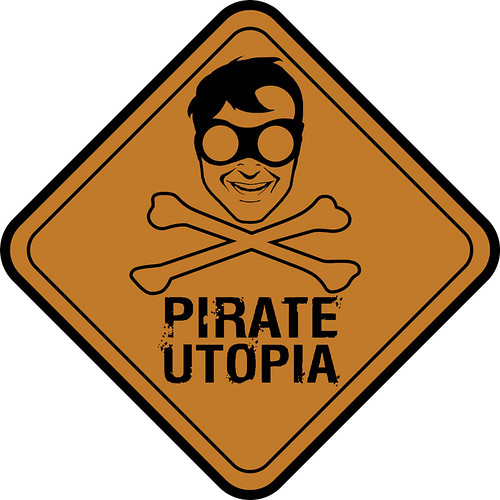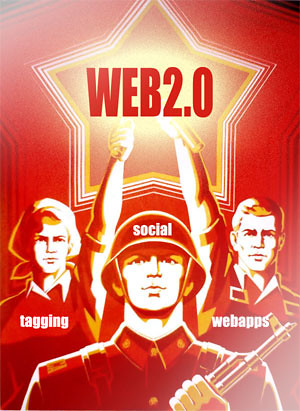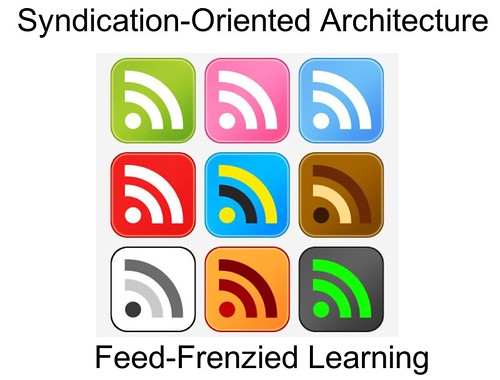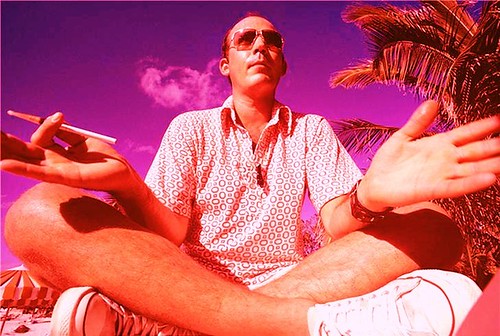Never mind the EduPunks
A child of 1992
- Coming after the end of the Cold War, 1992 saw the end of a Bush Presidency, with the election of a charismatic progressive with humble roots Robert Downey Jr's documentary 'The Last Party'
- Around that time, there was actual talk of The death of the brand - Naomi Klein, No Logo
The panic of Marlboro Friday was not a reaction to a single incident. Rather, it was the culmination of years of escalating anxiety in the face of some rather dramatic shifts in consumer habits that were seen to be eroding the market share of household-name brands, from Tide to Kraft. Bargain-conscious shoppers, hit hard by the recession, were starting to pay more attention to price than to the prestige bestowed on their products by the yuppie ad campaigns of the 1980s. The public was suffering from a bad case of what is known in the industry as "brand blindness."
...Then, in 1991, it happened: overall advertising spending actually went down by 5.5 percent for the top 100 brands. It was the first interruption in the steady increase of U.S. ad expenditures since a tiny dip of 0.6 percent in 1970, and the largest drop in four decades.
- Pirate Utopia, Julian Dibbell
an attempt to frame the prospects for online autonomous zones in the only discursive terms Net culture had ever really respected: rough consensus and running code. May laid a whole shopping list of cool hacks and peer-to-peer conspiracies on me -- anonymous remailers, untraceable e-cash, zero-knowledge markets in corporate secrets, pirated software, and murder contracts -- and each one grabbed my attention like he was telling me the precise date and channel the revolution would be televised on.
...it literalized how pregnant with possible futures the post-Cold War world had become and the Net was then becoming. The way it even somehow conceptually resembled the iconic cybercultural image of the day -- the fractal Mandelbrot set, with its levels within levels of intricately chaotic structure, swirling psychedelically on a million dorm-room computer screens like so many digital-age lava lamps, blowing minds the same way Tim May had just blown mine.
It was stego. And it was so -- I can't think how else to put it -- so very 1992.
- "PC is the LSD of the 1990's... Turn on, boot up, jack in." - Timothy Leary

It took a long time for the revolution to happen, but for a while the historic arc seemed clear
- In 1999, the World Wide Web inventor Sir Tim Berners-Lee looked back on the previous decade and lamented: "I wanted the Web to be what I call an interactive space where everybody can edit. And I started saying ‘interactive,’ and then I read in the media that the Web was great because it was ‘interactive,’ meaning you could click. This was not what I meant by interactivity." - link
- Around this time, wikis were coming into a form of maturity, growing throughout 1990's, 2001 saw publication of Ward Cunningham's The Wiki Way, birth of Wikipedia.
- The notion of blogging took hold as a popular medium - History of blogging timeline

Participation
There's this photo of Barack Obama taken by the Associated Press last year when he visited Berlin:
What is notable about this photo?

Self-serving digression
- started hosting blogs and wikis at UBC in 2003, seen as highly marginal activity at the time
- Small Pieces Loosely Joined showed us a glimpse of an open, connected, social future...
- http://blogs.ubc.ca - robust open source WordPress platform
- Alternate Worlds - rich course environment integrating WordPress and BuddyPress. Background here and here.
- Interview: WordPress as Learning Management System
- Dev. WPMU Edu - Making WPMU work in education, one hack at a time
- UMWBlogs - "Two years worth of iteration and development given to Longwood in less than an hour."
- essential works from Alan Levine: 50 Web 2.0 ways to tell a story, Amazing Stories of Openness

A digression on a digression... open formats, open data
- Dr. Mashup - EDUCAUSE Review
- Radical Reuse A Survivalist Handbook to the End of Edtech

Crest of a wave
With the convergence of open content, open source, open standards... it can seem as if there is an unstoppable momentum behind us, a movement toward a oneness of data, deep interconnectedness, linkages of consciousness with an almost psychedelic intensity... But... but... but...
History is hard to know, because of all the hired bullshit, but even without being sure of “history” it seems entirely reasonable to think that every now and then the energy of a whole generation comes to a head in a long fine flash, for reasons that nobody really understands at the time—and which never explain, in retrospect, what actually happened.
...You could strike sparks anywhere. There was a fantastic universal sense that whatever we were doing was right, that we were winning.
And that, I think, was the handle—that sense of inevitable victory over the forces of Old and Evil. Not in any mean or military sense; we didn’t need that. Our energy would simply prevail. There was no point in fighting—on our side or theirs. We had all the momentum; we were riding the crest of a high and beautiful wave. . .
So now, less than five years later, you can go up on a steep hill in Las Vegas and look West, and with the right kind of eyes you can almost see the high-water mark—that place where the wave finally broke and rolled back.
-- Hunter S. Thompson, Fear and Loathing in Las Vegas

Now, what does it all have to do with EduPunk?
- I was there when EduPunk was born. A date with Jim Groom at Freddy's (a bar which is slated for destruction, to make room for a stadium)
We talked about writing a punk-themed zine along the lines of on how to run an ed tech operation for no money. (Later we did do something like that with a different theme, the survivalist-tinged Radical Reuse).
- Bavatuesdays, The Glass Bees - "Corporations are selling us back our ideas, innovations, and visions for an exorbitant price. I want them all back, and I want them now!"
It generated an ungodly number of blog posts, and garnered a surprising amount of attention outside the world of education.


- Bavatuesdays, Murder, Madness, Mayhem
- Murder, Madness, and Mayhem Project Page - the work of UBC Professor Jon Beasley-Murray, (Wikipedia Page, Blog)
- Article: El Señor Presidente
- The FA Team
Why does this work appeal so much?
- fast, cheap, and out of control...
- augments traditional literacy with new media literacy
- results in genuinely useful public knowledge resources (perhaps the essence of open education resources)
- students will respond to tasks that are authentic

- Bavatuesdays, Permapunk - permaculture, the learning party

http://makingmakers.posterous.com/ - Maker culture http://www.youtube.com/makerculture#g/u - Interview videos
"a growing community of hobbyists and professionals dedicated to making their own functional devices, whether it be technological gadgets, open source hardware and software, fashion apparel, home decorating, or nearly any other aspect of physical life. The movement stems from a direct reaction to a consumer culture in which most products have become steadily homogenized and local industry has given into big box retailing of dull products made with cheap foreign labor."
- Here in Spain, ZEMOS98, Bank of Common Knowledge (Platoniq), Wikim etc...

Why may the wave have crested?
- Copyright law becoming ever more restrictive, and undemocratic. See the Anti-Counterfeiting Trade Agreement. Ongoing commentary from Michael Geist: "Critics argue ACTA is part of a broader strategy of venue shopping and policy laundering employed by the trade representatives of the US, EC, Japan, and other supporters of rigid intellectual property enforcement. This strategy entails negotiating for terms in international treaties that might prove too politically unpopular to pass in national assemblies."
- Mobile web applications moving increasingly toward isolated proprietary model, and away from "the internet as platform. A shame, because open standards like RSS can already do so much to enable MobileCourseDiscussions.
...big players like Facebook, Apple, and News Corp are potentially breaking the "small pieces loosely joined" model of the Internet. But perhaps most threatening of all are the natural monopolies created by Web 2.0 network effects.
One of the points I've made repeatedly about Web 2.0 is that it is the design of systems that get better the more people use them, and that over time, such systems have a natural tendency towards monopoly.
And so we've grown used to a world with one dominant search engine, one dominant online encyclopedia, one dominant online retailer, one dominant auction site, one dominant online classified site, and we've been readying ourselves for one dominant social network.
...it's a war against the web as an interoperable platform. Instead, we're facing the prospect of Facebook as the platform, Apple as the platform, Google as the platform, Amazon as the platform, where big companies slug it out until one is king of the hill.
And it's time for developers to take a stand. If you don't want a repeat of the PC era, place your bets now on open systems. Don't wait till it's too late.
-- Tim O'Reilly, The war for the web
- Apple is not your friend: arbitrary application approval for iPhone apps; iTunesU - not available through browser, direct linking not possible, does not support open source formats such as OGG
- Facebook is not your friend: Beacon, repeated privacy tricks, dubious ties to the NSA
I don’t know about you, but a future without URLs and without the infinite organicity of the web frightens me. It’s not that I know what we’ll lose by removing this artifact of one of the most generative periods in history — and that’s exactly the point! The URL and the ability for anyone to mint a new one and then propagate it is what makes the web so resilient, so empowering, and so interesting! That I don’t need to ask anyone permission to create a new website or webpage is a kind of ideological freedom that few generations in history have known!
-- Tim Mussina, The death of the URL
- the degeneration of the URL -- Google is not your friend! WordPress.com is not your friend!
What is a reasonable, pragmatic approach to corporate control of the web?
Sex Pistols: "I use the enemy. I use anarchy."

Join the secret revolution

The Open Education Conference is coming to Barcelona!














